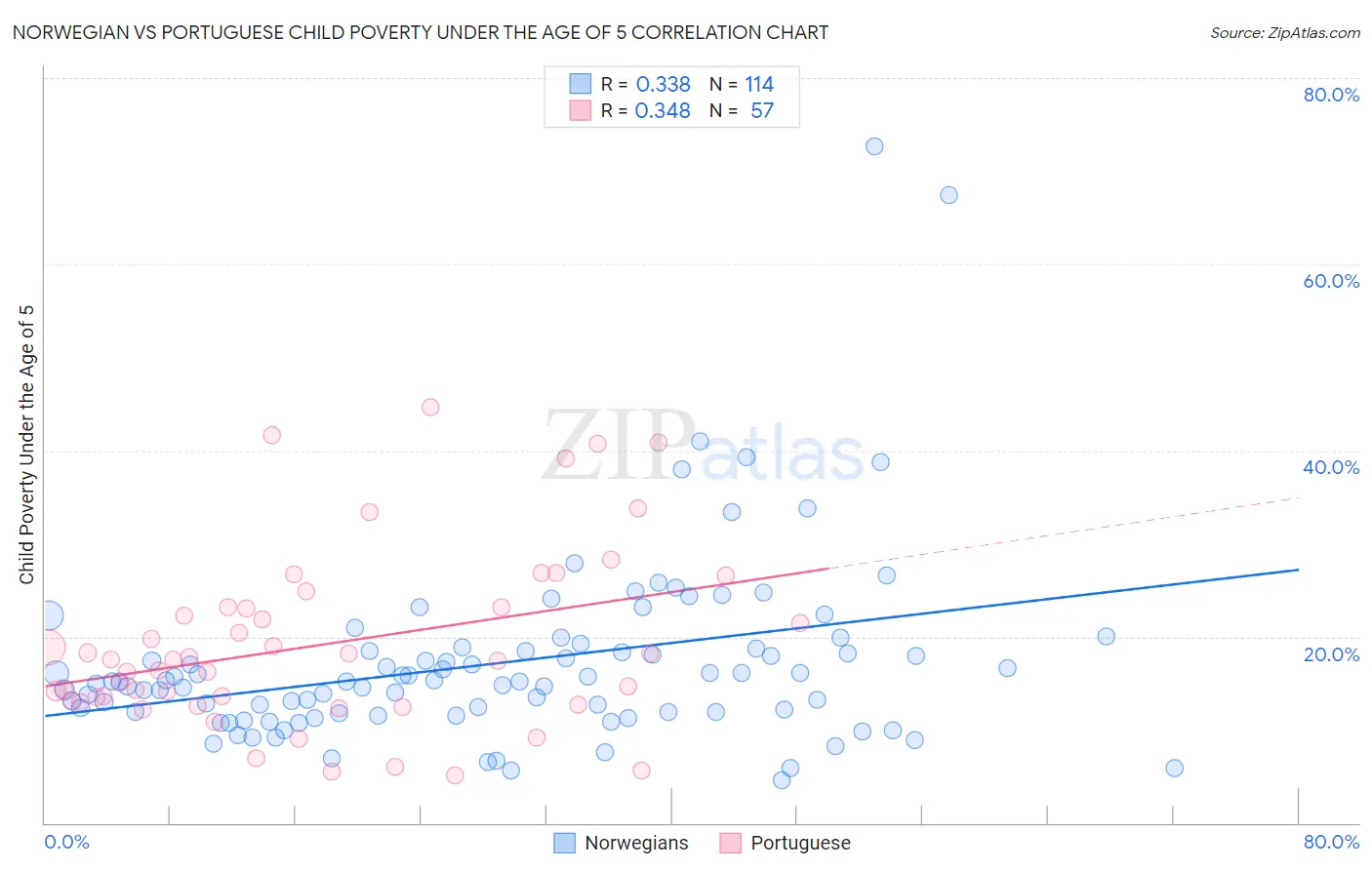Norwegian vs Portuguese Child Poverty Under the Age of 5
COMPARE
Norwegian
Portuguese
Child Poverty Under the Age of 5
Child Poverty Under the Age of 5 Comparison
Norwegians
Portuguese
14.6%
CHILD POVERTY UNDER THE AGE OF 5
99.7/ 100
METRIC RATING
39th/ 347
METRIC RANK
16.5%
CHILD POVERTY UNDER THE AGE OF 5
83.0/ 100
METRIC RATING
142nd/ 347
METRIC RANK
Norwegian vs Portuguese Child Poverty Under the Age of 5 Correlation Chart
The statistical analysis conducted on geographies consisting of 498,503,242 people shows a mild positive correlation between the proportion of Norwegians and poverty level among children under the age of 5 in the United States with a correlation coefficient (R) of 0.338 and weighted average of 14.6%. Similarly, the statistical analysis conducted on geographies consisting of 426,968,187 people shows a mild positive correlation between the proportion of Portuguese and poverty level among children under the age of 5 in the United States with a correlation coefficient (R) of 0.348 and weighted average of 16.5%, a difference of 13.2%.

Child Poverty Under the Age of 5 Correlation Summary
| Measurement | Norwegian | Portuguese |
| Minimum | 4.5% | 5.1% |
| Maximum | 72.7% | 44.7% |
| Range | 68.2% | 39.6% |
| Mean | 17.2% | 19.2% |
| Median | 15.2% | 17.5% |
| Interquartile 25% (IQ1) | 11.9% | 13.0% |
| Interquartile 75% (IQ3) | 18.5% | 23.2% |
| Interquartile Range (IQR) | 6.6% | 10.1% |
| Standard Deviation (Sample) | 10.0% | 9.5% |
| Standard Deviation (Population) | 10.0% | 9.4% |
Similar Demographics by Child Poverty Under the Age of 5
Demographics Similar to Norwegians by Child Poverty Under the Age of 5
In terms of child poverty under the age of 5, the demographic groups most similar to Norwegians are Eastern European (14.6%, a difference of 0.0%), Turkish (14.6%, a difference of 0.27%), Immigrants from Australia (14.6%, a difference of 0.29%), Immigrants from Belarus (14.7%, a difference of 0.41%), and Soviet Union (14.7%, a difference of 0.57%).
| Demographics | Rating | Rank | Child Poverty Under the Age of 5 |
| Immigrants | Sri Lanka | 99.8 /100 | #32 | Exceptional 14.4% |
| Taiwanese | 99.8 /100 | #33 | Exceptional 14.5% |
| Immigrants | Moldova | 99.8 /100 | #34 | Exceptional 14.5% |
| Latvians | 99.8 /100 | #35 | Exceptional 14.5% |
| Maltese | 99.8 /100 | #36 | Exceptional 14.5% |
| Turks | 99.7 /100 | #37 | Exceptional 14.6% |
| Eastern Europeans | 99.7 /100 | #38 | Exceptional 14.6% |
| Norwegians | 99.7 /100 | #39 | Exceptional 14.6% |
| Immigrants | Australia | 99.7 /100 | #40 | Exceptional 14.6% |
| Immigrants | Belarus | 99.7 /100 | #41 | Exceptional 14.7% |
| Soviet Union | 99.7 /100 | #42 | Exceptional 14.7% |
| Immigrants | Greece | 99.7 /100 | #43 | Exceptional 14.7% |
| Immigrants | Philippines | 99.7 /100 | #44 | Exceptional 14.7% |
| Laotians | 99.6 /100 | #45 | Exceptional 14.7% |
| Tsimshian | 99.6 /100 | #46 | Exceptional 14.7% |
Demographics Similar to Portuguese by Child Poverty Under the Age of 5
In terms of child poverty under the age of 5, the demographic groups most similar to Portuguese are Samoan (16.5%, a difference of 0.010%), Immigrants from Western Europe (16.5%, a difference of 0.040%), Ethiopian (16.5%, a difference of 0.070%), Immigrants from Ethiopia (16.6%, a difference of 0.18%), and Israeli (16.6%, a difference of 0.19%).
| Demographics | Rating | Rank | Child Poverty Under the Age of 5 |
| Brazilians | 87.8 /100 | #135 | Excellent 16.4% |
| Immigrants | Northern Africa | 87.5 /100 | #136 | Excellent 16.4% |
| Immigrants | Chile | 85.3 /100 | #137 | Excellent 16.4% |
| Germans | 84.8 /100 | #138 | Excellent 16.5% |
| Immigrants | Hungary | 84.5 /100 | #139 | Excellent 16.5% |
| Guamanians/Chamorros | 84.2 /100 | #140 | Excellent 16.5% |
| Immigrants | Western Europe | 83.3 /100 | #141 | Excellent 16.5% |
| Portuguese | 83.0 /100 | #142 | Excellent 16.5% |
| Samoans | 83.0 /100 | #143 | Excellent 16.5% |
| Ethiopians | 82.7 /100 | #144 | Excellent 16.5% |
| Immigrants | Ethiopia | 82.1 /100 | #145 | Excellent 16.6% |
| Israelis | 82.0 /100 | #146 | Excellent 16.6% |
| Immigrants | Nepal | 80.3 /100 | #147 | Excellent 16.6% |
| Syrians | 79.1 /100 | #148 | Good 16.6% |
| New Zealanders | 78.7 /100 | #149 | Good 16.6% |